There’s no hiding from the fact that becoming a UX researcher might seem like a gamble right now—UX salary data and the job market paint a mixed perspective for the present and future of the industry.
While no job is 100% recession-proof, there’s no doubt that demand for user insights and UX researchers will remain in high demand. After all, companies still need user insights to help them weather the storm of uncertainty and bounce back stronger than before.
Whether you’re looking to start a career in user research, transition into a more research-focused role, or #OpentoWork, UX research is a flexible and fulfilling career path that will continue to grow and evolve—even through challenging times like now.
So how do you become a UX researcher? There’s no cookie cutter path to start a career in UX research; UX researchers come from different backgrounds and experiences. But the common denominator shared by UX researchers is that they’re hyper-curious and have a deep understanding of human behavior.
In this guide, you’ll learn which skills, education, work experience, certificates, and more you need to start a career in UX research. Here’s what you’ll find:
- How to break into UX research
- Educational requirements and alternatives for UXR
- Skills required for each UX research career path
- Additional UXR career resources to help you get started
Read the The State of User Research 2024 for insights on user researchers.
How do you get into UX Research?
If you were looking for a singular path to break into UX research, you won’t find it here — there is no one way to get into UXR (which can be a good thing!).
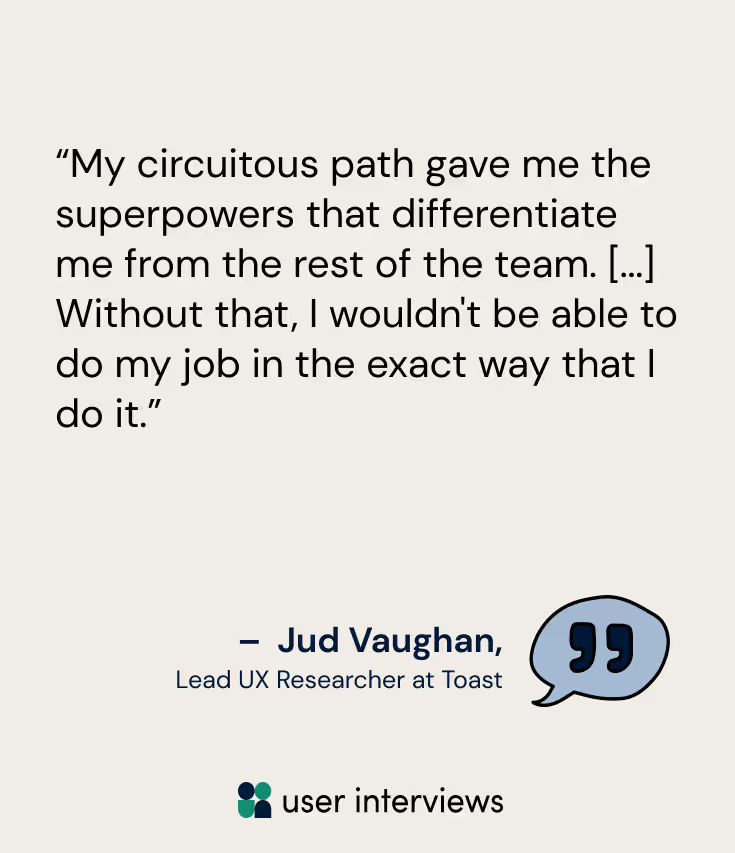
You can find your way to a career in research through academia, design, product, writing—the possibilities are honestly endless. But, as we talked to people who work with UXR and researched how they go about their jobs every day, here are a few common traits shared by most successful UXR professionals.
UX researchers are:
- Deeply interested in human behavior and thought processes
- Well-versed in various research methods
- Detail-oriented yet big-picture thinkers who help facilitate large-scale change
Start with an interest in people
One of the things that binds user researchers together is an unending curiosity about people. What makes them tick, why they chose one option over another, what their lives are like outside of your research project. User researchers are responsible for bringing the voice of people who use the product every day to their teams.
If you’re hoping to get into a user research career, lean into your hyper-curiosity. Whether you’re transitioning from another role to a user research centric one or making a fresh start after earning a degree (congrats by the way! 🥳), continue building your interest in people. You can practice UX research skills in your everyday life by asking detailed questions, consciously avoiding bias, and getting comfortable talking to strangers.
You can also take this curiosity about those around you and build relationships with people in the UX research community—we’re generally a pretty friendly bunch! Some strategies to get involved include:
- Join Slack groups like Mixed Methods and Designer Slack Communities.
- Strike up conversations about things you’re interested in learning about and contribute to conversations that are already happening.
- Reach out to people who hold the positions you hope to one day occupy and ask them how they got where they are.
Forming these relationships and embedding yourself in the community will not only help you find the right job, you’ll learn more about the user research world as a whole.
.avif)
Here are some of the other best UX research communities you can join to start networking:
- Mind the Product
- Service Design Network
- User Experience Professionals Association
- HCI/UX Mentoring Circle
- EPIC People
🏆 Follow these Top UX Research Leaders on LinkedIn.
Hone your researching skills
While there’s no one right way to make your way into user research, you will need some experience conducting research to get a job as a dedicated user researcher.
- If you’re still in school, consider a research-focused course.
- If you’re transitioning your career, see if there are any research studies at your current company you can get involved with.
Either way, starting to hone your skills with generative interviews, usability testing, user analytics, and other kinds of research will help you immensely.
🎓 Stream our Research 101 Course for free.
Don’t know where to start? Reach out to your local tech incubator, startups, or non-profits in your area. Volunteer your time for an opportunity to hone your research skills and work on research projects you’re excited about. You can also continue building your skills through free resources, like UX research and design books, blog posts, and the User Interviews Field Guide.
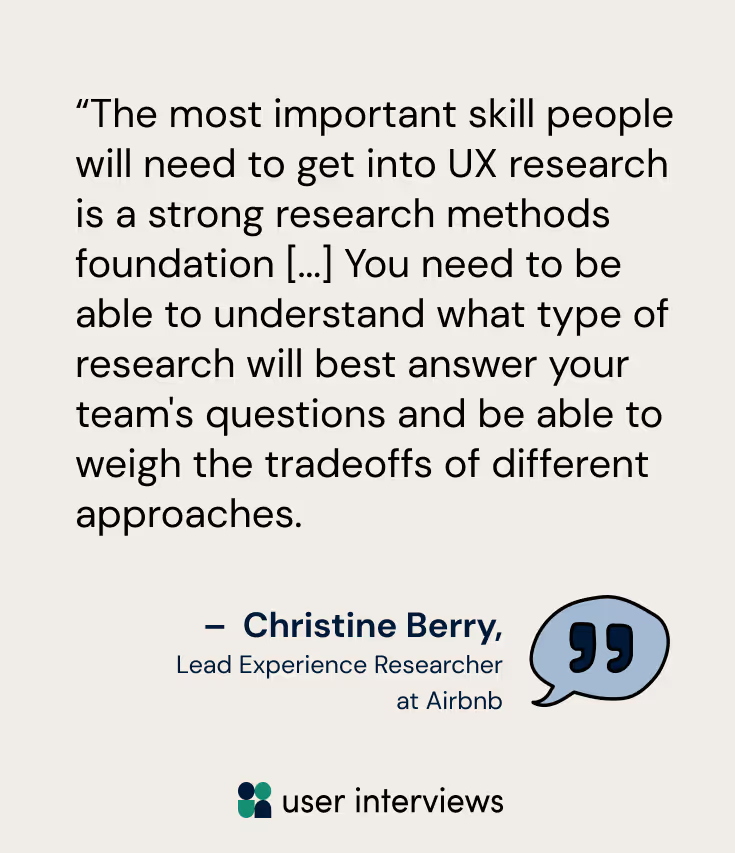
You don’t have to be a full-time researcher
You don’t have to be a user researcher to be involved in user research. Just like there’s a wide variety of ways to get to a user research related role, there are many different roles that involve user research and do lightweight versions of UX research.
Some of these roles include:
- ReOps managers
- Designers
- Product Managers
There are so many non-researchers helping with research that they have their own name: "People who Do Research" or PwDR. PwDR engage in lots of research activities to improve their work.
If you’re not sure about doing research full-time, you can consider becoming a lightweight version of a UXR through decentralized research. You can start in a UX-related field to get experience with lightweight studies or at least get involved with user research.
So even if a full-time research position doesn’t sound like your jam, there’s a place for you in the research-sphere.
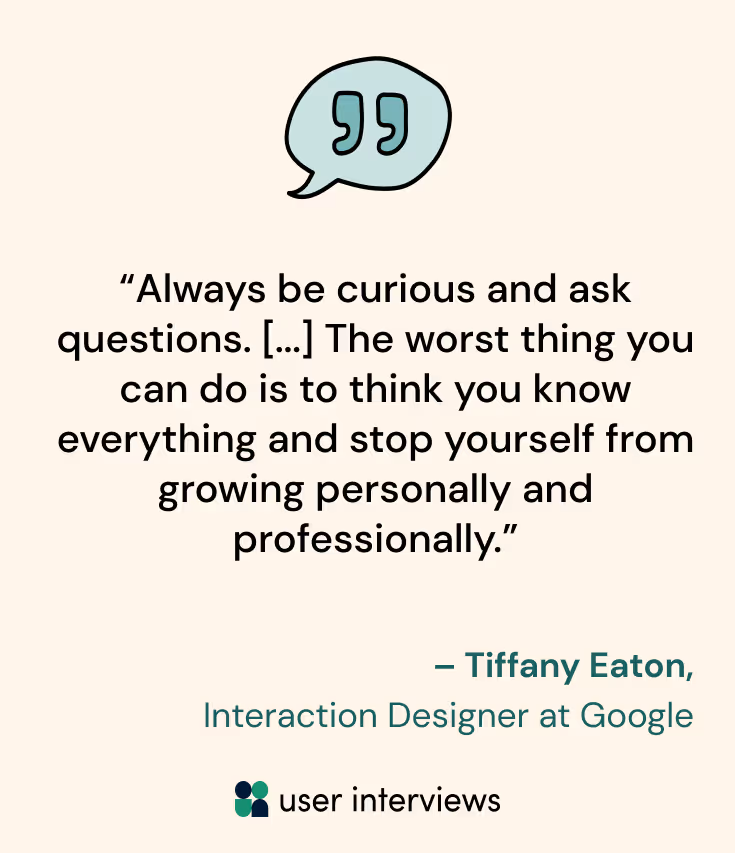
Educational requirements and alternatives for UX researchers
One of the first questions that come to mind when choosing a career path is: do I need to go to school for this?
It’s a valid question, considering how much time and money formal degrees can cost. Here’s what you need to know.👇
Do you need an advanced degree to become a UX researcher?
The short answer is no, you don’t need a master’s or PhD to become a UX researcher, but a majority of UX researchers do have formal education or training in user research. About 60% of researchers in our State of User Research Report acquired their UX knowledge via a university degree. Folks in Design, UX, and ReOps reporting learning on the job.

“Your work experience in applied research (i.e., your strength in research methodologies, analysis, write-ups/presentations, and explaining the implications of your research on product strategy and/or product design) is more important than the level of your academic degree.”
– Tatiana Vlahovic, UX Research & Partnerships Lead at Reduct
However, having a formal education with an advanced degree can help establish you as an academic researcher and connect with others who share a passion for research.
Certainly I’ve known many people in this field who are very successful and yet don’t have an advanced degree. But I think that having an advanced degree in a relevant field increases the likelihood of your success as a UX researcher, especially in today’s environment.
– Tom Tullis, Former VP of UX Research at Fidelity in Five Tips for a Successful Career as a UX Researcher
There are many UX researchers who have chosen to start their careers from other industries or specialties, like this one researcher named Summer who embarked on a 6-month journey to break into UX research with no prior experience.
What kind of degrees do UX researchers have?
People can study all kinds of things and end up in user research roles. From our very first State of User Research Report, we found that our user researcher respondents held a wide variety of bachelor degrees, ranging from business administration to industrial design degrees. Nowadays, it’s common for people to study psychology, statistics, human-computer interaction, information systems or a related field for a bachelor’s degree if they plan on building a UX research-related career.
People who are specifically pursuing graduate degrees with the intention of working in user research after they graduate typically choose fields related to Human Factors, Human Computer Interaction, or more formal academic research like psychology. Our past research confirms that these are popular majors of many who end up with user research related careers, but so are a number of other disciplines.

Many of our respondents had earned degrees in Human Computer Interaction, but just as many had earned graduate degrees in Library Science. The top three graduate degrees among our respondents were Human Centered Computing, Human Factors, and Psychology.
While it’s not required to follow the same path and choose these majors, studying research-related disciplines can help establish a strong academic foundation for building your research knowledge. If you’re still in school or about to start a graduate program, consider taking courses related to these majors.
But don’t worry if another degree isn’t feasible for you; some people don’t even find out about UX research until years into their careers. Plus, UX research is a highly flexible field that a lot of professionals transition to from other fields.
How to build your UX research career without going back to school
An advanced degree may not be an option for everyone, considering the time and money required. But the good news is, there are many ways to build your research skills without heading back to school.
Here’s an overview of what you can do to get started:
- Build a UX research portfolio. Be ready to showcase any mock case studies or real research projects you were involved in.
- Network with other researchers in online communities, conferences, or events.
- Take online courses and get professional certificates. Online courses and bootcamps aren't for everyone, but taking UX bootcamps can be a great supplemental source of education to formal UX training. Some courses even allow you to audit the lessons for free before committing to it, and they offer professional certificates once completed.
🌱 Visit our Professional Growth Hub for more free resource.
What kinds of jobs are available in UX research?
There are tons of ways to have a career in UX research. You can be a researcher, a product manager, a designer, a writer, a marketer, a developer, or any number of things—who can keep up with all the changing titles out there these days? Here are some of the most common roles.
✨ Looking to start applying? Bookmark this filterable jobs board.
What is a UX Researcher?
UX or user researchers are responsible for bringing the voice of the customer to the team. They may conduct qualitative and quantitative research studies to help teams answer pressing business, product, and customer questions. A UX or user researcher should be well-versed in research practices, have a genuine interest in people, and a deep understanding of human behavior.
User researchers often work with design and product teams on things like discovery and evaluative research. The insights they uncover help companies make smarter business and product decisions.
While researchers conduct qualitative and quantitative research to uncover user needs, pain points, and behaviors, UX research isn’t just about doing research. There’s so much more that goes into the research process. UX researchers also spend their time planning research studies, running sessions, organizing research studies, working with cross-functional teams, analyzing the results, and presenting them to stakeholders.
UX researchers need strong research skills (plot twist, we know), but that’s not all it takes to be a great researcher. UX researchers need to be relentlessly curious, analytical, well-organized, and deeply empathetic.
Companies are looking for UX researchers who have experience in:
- Recruiting and scheduling
- Generative research
- Usability testing
- Quantitative methods
- Synthesis
- Reports
Learn more about each of these in our UX Research Field Guide 🗺️.
What is Research Operations?
Research Ops is just as the name suggests: the operations behind user research. ReOps professionals are responsible for creating scalable, repeatable practices for sharing, storing, and presenting research to the rest of their team.
Commonly, they focus on participant management, governance, knowledge management, tools, competency, and advocacy. Some of the responsibilities of ReOps managers include helping researchers to:
- Plan and schedule research sessions
- Recruit and manage participants
- Coordinate collaboration and democratization
- Analyze, report, and share insights
While it may seem like Research Ops operates behind the scenes most of the time, one of their key goals is to make research visible and accessible to the wider organization. ReOps managers help research teams communicate the value of research to the organization.
Like operational roles in other industries, ReOps managers need to be systems thinkers. You should be skilled in evaluating the day-to-day rhythms of how research is conducted and implement strategies to increase efficiency and impact. Since this role typically works closely with research, product, design, and data teams, you’ll need sharp collaboration skills as well.
Brush up on some of the core skills and ideas you need as a Research Ops manager👇
- Research Operations: The Practice, The Role, and Its Impact
- So You Want to Be In Research Ops? How Roy Olende of Zapier Made The Switch
- Kate Towsey on Starting a ReOps Practice
What is a UX Designer?
Designers can come in lots of different forms. Just like there are a lot of ways to be involved with user research, there are a lot of ways to be involved with design. UI, UX, product, the list goes on. We’ll focus on UX designers and product designers for the sake of brevity in this section.
Many designers, especially UX, UI, and product designers, conduct user research. For some designers, they are the sole source of qualitative research within a team. So if you’re looking to combine your love of design with your love of research, a design position might be your cup of tea.
“Make context as essential a deliverable as sparkly hifi mocks. The context of a problem proves whether or not it should be prioritized, the context of research proves whether or not solutions should be pursued, the context of your chosen solution proves its impact towards the long term vision.”
– Allison Milchling, Product Designer at Atrium
A UX designer is someone who designs and creates user experiences. UX designers use research to ensure their designs are useful, usable, and accessible to users.
To be a UX designer, you’re going to need some design chops (another shocker). UX designers think about usability, flows, and user feedback. To be a great UX designer, you’ll need skills in ideation, lo-fi design, hi-fi design, implementation, usability testing, and quantitative research.
What do Product Designers do?
A product designer is someone who designs and creates digital experiences. Depending on where they work, their day to day can look very similar to that of a UX designer.
This article from CareerFoundry does a good job of breaking down the difference between the two roles—the biggest one centers on priority. For UX designers, usability trumps all; product designers often balance user needs with those of the business, cost, and brand.
To be a product designer, you need to have both creative and analytical skills in abundance. Product designers think about the business impact of design choices as well as the user experience. To be a great product designer, you’ll need skills in ideation, lo-fi design, hi-fi design, usability testing, and quantitative research.
🎨 Here's our guide to doing research as a designer.
What is a Product Manager?
Product Managers are responsible for, well, managing the product. That means they have to decide how to create the best products for their users, coordinating everyone involved in creating the final product.
The product manager (PM) profile is a notoriously slippery fish—since product managers sit at the intersection of so many departments and stakeholders, the scope and focus of a particular PM role varies greatly from company to company. But to oversimplify: Product managers are in charge of making sure the right things are built at the right time. They do this by organizing teams of engineers and designers to create impactful features and user friendly products that meet business expectations.
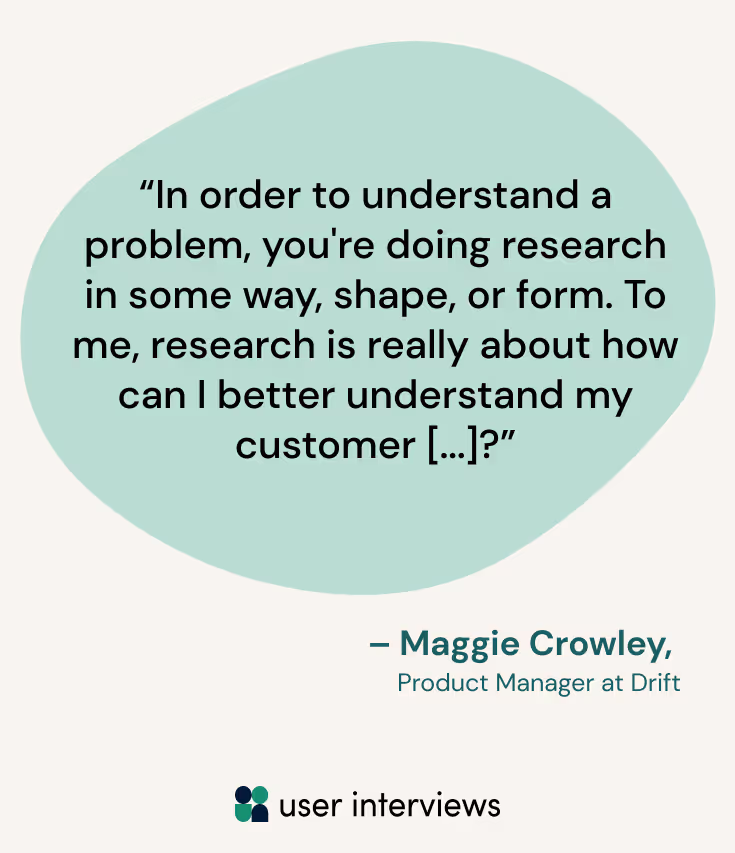
To be a product manager, you’ll need organizational skills, high emotional intelligence, and some technical know-how. To be a great product manager, you’ll need experience running design sprints, prioritizing features, defining and tracking success, conducting generative research, running usability tests, and gathering quantitative research.
🧱 Here's our guide to doing research as a PM.
What is a UX Writer?
UX writers are a fairly new phenomenon, and there’s already a lot of growth in this field. The UX writer is responsible for creating all the copy surrounding a product or experience. Typically, UX writers possess stellar copywriting skills, a love of user research, and a collaborative mindset.
Sound like your kind of thing? This newsletter sends out UX writer jobs weekly. Plus, it includes links to great UX stories around the internet. You’re welcome.
According to Coursera,
“A UX writer plans and writes the microcopy in apps, websites, and other digital products users need to navigate a product.”
Basically, UX writers craft small pieces of writing for users. Some examples of microcopy might include:
- Menus
- Definitions
- Buttons
- Labels
- Chatbots
- Error messages
- User instructions
As a UX writer, you can test different pieces of copy, do user research, and interact with product teams to make sure the copy you write is effective.
UX writers are great at writing clear and concise copy. This field of work is different from copywriting because you have to know how to communicate a message clearly with very limited text space.
Here are other skills you should develop as a UX writer:
- Technical skills: Understand technical concepts and communicate them in simpler terms for users.
- Content strategy: Be aware of writing goals and have a plan for your writing.
- Collaboration: Be ready to work with designers and the product team on a regular basis to make sure your copy is user-friendly.
What is the average salary in UX?
That will depend on a variety of factors, including seniority, industry, role type, and geographic location. Here is a breakdown from our UX Salary Report:
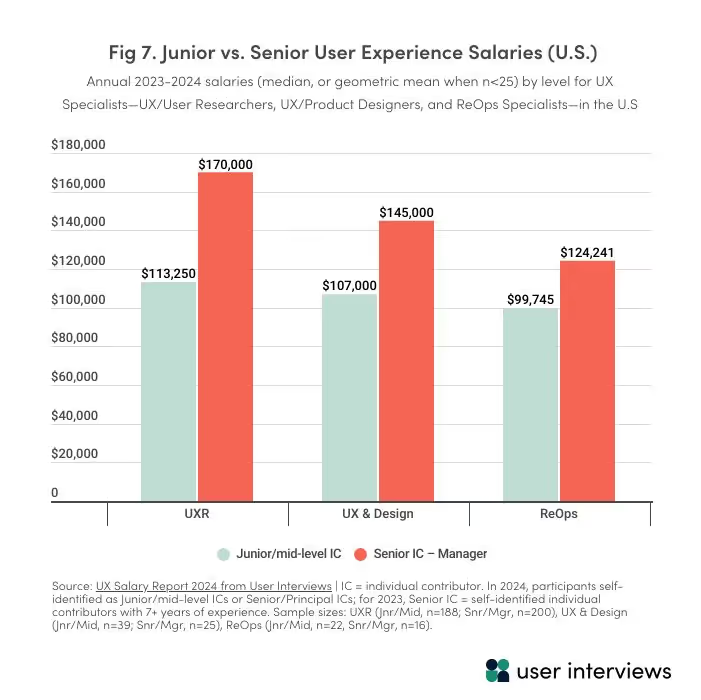
Is UX research a fulfilling career?
Although many UX professionals report feeling uncertain about their futures, the majority are positive and find the work fulfilling.
.avif)
Move toward opportunities, not labels
The UX research career path is diverse, from dedicated UX researchers to product managers, there are tons of ways to be involved in user research. Whether you choose to become a UX researcher or find another career path that suits your interests better, choose a path you’re passionate about and makes you excited to go to work every morning.
Here’s a great piece of career advice from Alissa Lee, UX Designer at Indeed.
“Move towards opportunities, not labels. Job titles are going to change from company to company. The best thing you can do is search by responsibilities and skills that interest you, and then work backwards to find the relevant job title that gives you the opportunities to do them”



















